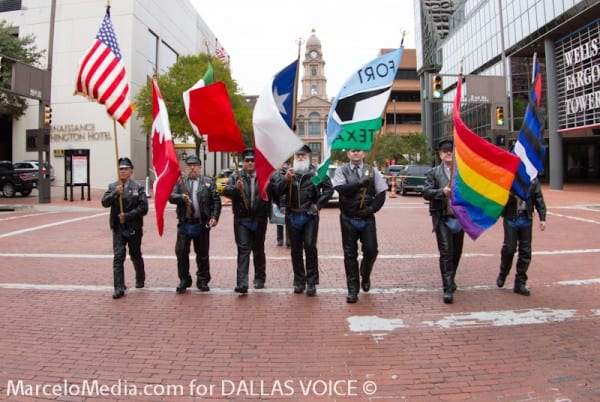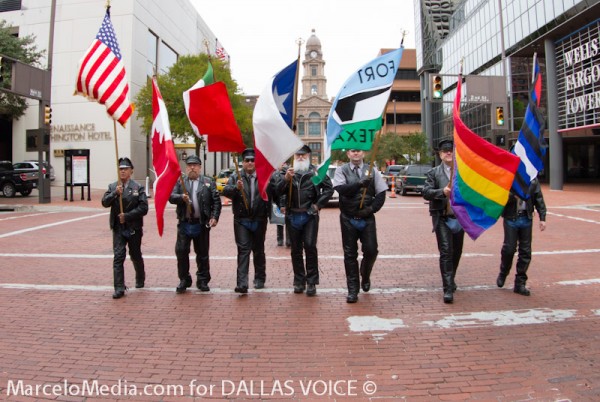CLICK HERE TO VIEW MORE PHOTOS FROM TARRANT PRIDE
Participants say parade, in 2nd year on Main Street, presents positive image of LGBT community
LOGAN CARVER | Contributing Writer
FORT WORTH — Perry Anable wiped tears from his eyes Saturday as he watched throngs of gays, lesbians, allies and passersby mingle on Main Street in Fort Worth after the largest gay Pride parade in the city’s history.
Anable, brother of the late activist Thomas Anable — who was named grand marshal before his August death and who was honored during the parade with a riderless car — said the large turnout showed that gay people finally have a voice in the city of Fort Worth and are no longer afraid to live their lives openly.
Thomas Anable helped formed Fairness Fort Worth after the Rainbow Lounge raid and was instrumental in the parade’s move from Jennings Street to Downtown.
“That’s what I believe I fought for is this right here,” said Perry Anable, a Vietnam veteran. “Whether you agree with the choice isn’t important; it’s that you have the freedom to choose, and that’s what this is about.”
The first bite of autumn couldn’t chill the spirits of parade-goers as floats made their way from the Tarrant County Courthouse to the Fort Worth Convention Center.
And while there was no shortage of shirtless dancers gyrating to thumping bass, the Fort Worth parade was markedly different than its Dallas cousin.
If Dallas Pride is your flashiest pair of pumps, Fort Worth Pride is your favorite pair of Tom’s. It doesn’t have the glitz and the glamour, but it exudes a feeling of community that doesn’t go unnoticed.
The Fort Worth parade was started 31 years ago by a drag queen who wanted a place for gays to congregate that wasn’t between the four walls of a bar, said parade director Tina Harvey.
For nearly three decades, the parade took place on Jennings Street — celebrating gay Pride in front of nothing but bars, dilapidated storefronts and homeless people. Last year, with the help of Thomas Anable, the parade moved to downtown and marked a new era in the Fort Worth LGBT community.
Harvey said it gives credibility to people who have been treated as second-class citizens their entire lives; and the Main Street presence helps break down stereotypes.
“Other people can see our event going on and see ‘hey, they’re just a loving, tight-knit community and having a great time and this is a great thing,’” Harvey said. “If we’re down on Jennings, nobody comes except the gay community.”
Dana Curtis has participated in both the Dallas and Fort Worth parades and said the Fort Worth celebration is more personal.
“Everybody is on the same team in Fort Worth,” she said.
And for her, being able to ride a float down Main Street is liberating after years of oppression.
“(It’s an) absolute victory for those of us who have been marginalized for so long,” Curtis said. “We haven’t had a voice. Now we do.”
Craig McNeil, who marched with QCinema, said the parade’s downtown location — away from the bar district — makes families feel more comfortable.
“It’s good for them to see there aren’t naked people running around,” McNeil said. “It really is a great community event, and I think that’s great.”
On Saturday, the streets along the parade route were lined with elderly couples — gay and straight, families with children and allies who simply wanted to support equality in their community.
Sheldon Berry twirled a baton with the Fort Worth Pride Steppers and said it was important for non-gays in the city to see gay people who weren’t running around getting drunk.
“It’s not all like you see in the movies,” Berry said. “I just try to represent something really good and positive.”
Apparently Berry’s message was well received.
Kim Mixson was in town for a wedding, staying at a downtown hotel, and heard about the parade. She wore beads around her neck as she watched the floats roll down Main Street.
“I love it. I think it’s great. I see absolutely nothing wrong with it,” Mixson said. “People are people and to each their own.”
Rachel Tillay is a seminary student at Southern Methodist University and went to the Fort Worth parade to show support for the LGBT community and to serve as a counter balance to any anti-gay protestors.
To Tillay, anyone who claims to be Christian and uses scripture to support his or her hate speech doesn’t understand the Bible. She said the verses they take out of context and use to condemn homosexuality actually condemn a lack of hospitality, and when placed in the correct context have nothing to do with same-sex love.
“I’ve learned from my studies that we really need to be pro-gay if we want to be Christians,” Tillay said.
As expected, there were some purportedly Christian protestors quoting cherry-picked Bible verses in their vitriolic diatribe, but the Fort Worth Police Department kept them from interfering with parade viewers and participants and even straight people saw them as misguided afterthoughts.
“I think they should spend their time doing other positive things in the community instead of being out here worrying about how other people live,” said LeAnne Koonsman, who came to support the LGBT people she works with.
Fort Worth police said Monday that two anti-gay protesters were arrested. The arrested protesters are members of Kingdom Baptist Church in Johnson County, which has regularly staged anti-gay demonstrations in North Texas over the last few years. Joey Faust, 46, and Ramon Marroquin, 33, were charged with interfering with public duties, a class-B misdemeanor punishable by up to 180 days in jail and a maximum $2,000 fine. Faust is the pastor for Kingdom Baptist Church.
After the parade and the ensuing street festival, Harvey said this year’s event was a huge success.
“It was a beautiful day of celebration on Main Street,” she said.


